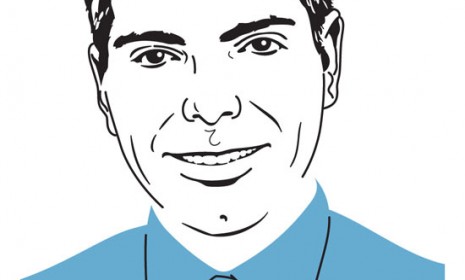The working class epidemic of demoralization
While coastal elites overindulge, struggling Americans in flyover country feel they have little to live for or believe in


I've written a lot this past year about the struggles of white, working-class communities. But nothing I have written will likely capture the desperation as completely as Anne Hull's Washington Post column about a struggling young woman named Tabitha Rouzzo.
If you haven't read it, you should. The column is remarkable, not just because it is interesting and well written, but also because it documents a phenomenon that has gone largely unnoticed and under-appreciated: The crushing burdens and near-impossible struggling of working-class white Americans.
It's probably natural that this story would speak to me. I'm from rural western Maryland. My dad was a correctional officer. I'm a graduate of a small college in West Virginia. But few of my colleagues have a similar background (and the ones that do would just as soon forget it.) Many of our opinion leaders are, for obvious reasons, disconnected from "flyover" country.
The Week
Escape your echo chamber. Get the facts behind the news, plus analysis from multiple perspectives.

Sign up for The Week's Free Newsletters
From our morning news briefing to a weekly Good News Newsletter, get the best of The Week delivered directly to your inbox.
From our morning news briefing to a weekly Good News Newsletter, get the best of The Week delivered directly to your inbox.
This disconnect between supposed thought leaders and much of the country's citizenry is problematic.
Good journalism requires investigating such trends and asking questions, such as: When did this slide start, and what is to blame?
As is often the case, the problem likely goes back to cultural changes that began in the 1960s — changes that eventually impacted small-town America.
A recent Vanity Fair article about "the Summer of Love" in San Francisco's Haight-Ashbury neighborhood in 1967 provides some clues:
A free daily email with the biggest news stories of the day – and the best features from TheWeek.com
Nicholas von Hoffman, of The Washington Post, who covered the Haight in a suit and tie, was, he says [by 1967], "appalled" by what he saw....
The overnight change in the attitude toward drugs was what alarmed von Hoffman...
Now, suddenly, he continues, "middle- and working-class kids were doing 'vice tours,' like American businessmen in Thailand: coming to the Haight for a few weeks, then, when the dirt between their toes got too encrusted, going home. This was when American blue-collar and middle-class kids became drug users. This was the beginning of the Rust Belt rusting."
This, I suppose, is an argument for the "no guardrails" theory — a theory that basically says the rich and famous can afford to live a bacchanalian existence, while those who emulate them pay the price.
A lifestyle of addiction, promiscuity, and chaos comes with a hefty price tag. Sadly, our elites are exporting those values to the people least capable of sustaining them. If you don't believe me, just watch MTV.
Aside from the money in their bank accounts, the spoiled kids featured on My Super Sweet Sixteen aren't terribly different from those featured in the trailer for MTV's upcoming reality series Buckwild. The difference, of course, is that the West Virginia kids being glamorized in Buckwild will grow old before their time — if they live long enough to grow old, that is. Most will likely spend the rest of their lives paying for the sins of their youth. The rich kids, on the other hand — well, they will likely land on their feet.
Hull's column demonstrates how bad moral decisions impacted Tabitha Rouzzo's family. For example, of Rouzzo's mom, Hull writes: "In her face and spirit were traces of the cheerleader who got pregnant in the eighth grade... They had two daughters and Tabi on the way when they split."
Rick Santorum has popularized the notion that being married before having kids — and then staying married — is good for the pocketbook. When we mock social conservatives for their "family values," we ought to remember the practical reason these values caught on.
Kids growing up in rural communities often face tremendous economic pressures and feel they have little to believe in. Many see little hope for their futures. They seem to lack a purpose in life, and humans need a purpose.
Cities offer their own challenges, of course, but they also have a different energy. They have museums, hustle, and bustle. Cities are where — as Matt Ridley says — "ideas have sex." Small communities lack this energy. (The Hal Ketchum song "Small Town Saturday Night" notes that you "gotta be bad just to have a good time.")
Of course, it would be wrong to assume this is all about values. Around the same time Hollywood started importing bohemian values to the heartland, our politicians began shipping jobs overseas — and waves of immigrants began pouring in.
This isn't new. We are a few generations into this trend, now. But we are close enough to remember the old days and resent what has been stolen from us. As Hall writes, "Tabi heard stories about the olden days. She came from welders and ceramic production workers. But, to Tabi, the sprawling Shenango China factory where her grandfather and great-grandfather worked was just a boarded-up place on the way to Walmart."
Economies change, and it would be wrong to suggest that we should use the forces of government to prevent this evolution. A free market demands that some businesses fail while others succeed. Towns also fail. Unfortunately, this means people fail. It would also be wrong of us not to acknowledge that there are real-life consequences to this "creative destruction."
I recently ran across a New York Times story about golfing great Ben Hogan that puts a face on this phenomenon. As The Times notes, Hogan's father, "a blacksmith put out of work by the spread of the automobile, had committed suicide, shooting himself while 9-year-old Ben looked on in horror."
One can only imagine this is a fairly common story.
This is a topic that deserves the attention of our political leaders. And perhaps, it finally will get it. There seems to be a strong indication that many working-class whites in the rust belt simply couldn't bring themselves to vote for Barack Obama or Mitt Romney. There is an opening for a political party to address these populist concerns. Will anyone answer the call?
Matt K. Lewis is a contributing editor at TheWeek.com and a senior contributor for The Daily Caller. He has written for outlets including GQ Politics, The Guardian, and Politico, and has been cited or quoted by outlets including New York Magazine, the Washington Post, and The New York Times. Matt co-hosts The DMZ on Bloggingheads.TV, and also hosts his own podcast. In 2011, Business Insider listed him as one of the 50 "Pundits You Need To Pay Attention To Between Now And The Election." And in 2012, the American Conservative Union honored Matt as their CPAC "Blogger of the Year." He currently lives in Alexandria, Va.
-
 How to financially prepare for divorce
How to financially prepare for divorceThe Explainer Facing ‘irreconcilable differences’ does not have to be financially devastating
-
 Why it’s important to shop around for a mortgage and what to look for
Why it’s important to shop around for a mortgage and what to look forThe Explainer You can save big by comparing different mortgage offers
-
 4 ways to save on rising health care costs
4 ways to save on rising health care costsThe Explainer Health care expenses are part of an overall increase in the cost of living for Americans
-
 Bari Weiss’ ‘60 Minutes’ scandal is about more than one report
Bari Weiss’ ‘60 Minutes’ scandal is about more than one reportIN THE SPOTLIGHT By blocking an approved segment on a controversial prison holding US deportees in El Salvador, the editor-in-chief of CBS News has become the main story
-
 Has Zohran Mamdani shown the Democrats how to win again?
Has Zohran Mamdani shown the Democrats how to win again?Today’s Big Question New York City mayoral election touted as victory for left-wing populists but moderate centrist wins elsewhere present more complex path for Democratic Party
-
 Millions turn out for anti-Trump ‘No Kings’ rallies
Millions turn out for anti-Trump ‘No Kings’ ralliesSpeed Read An estimated 7 million people participated, 2 million more than at the first ‘No Kings’ protest in June
-
 Ghislaine Maxwell: angling for a Trump pardon
Ghislaine Maxwell: angling for a Trump pardonTalking Point Convicted sex trafficker's testimony could shed new light on president's links to Jeffrey Epstein
-
 The last words and final moments of 40 presidents
The last words and final moments of 40 presidentsThe Explainer Some are eloquent quotes worthy of the holders of the highest office in the nation, and others... aren't
-
 The JFK files: the truth at last?
The JFK files: the truth at last?In The Spotlight More than 64,000 previously classified documents relating the 1963 assassination of John F. Kennedy have been released by the Trump administration
-
 'Seriously, not literally': how should the world take Donald Trump?
'Seriously, not literally': how should the world take Donald Trump?Today's big question White House rhetoric and reality look likely to become increasingly blurred
-
 Will Trump's 'madman' strategy pay off?
Will Trump's 'madman' strategy pay off?Today's Big Question Incoming US president likes to seem unpredictable but, this time round, world leaders could be wise to his playbook
